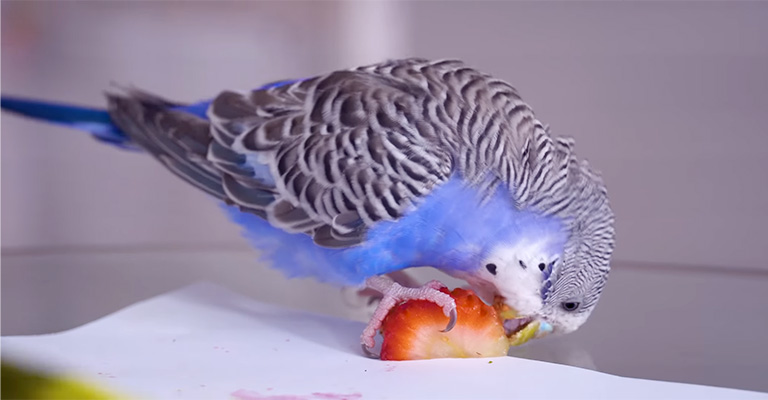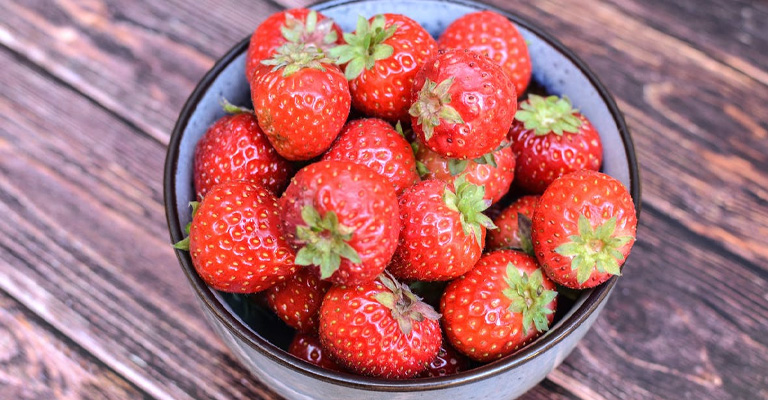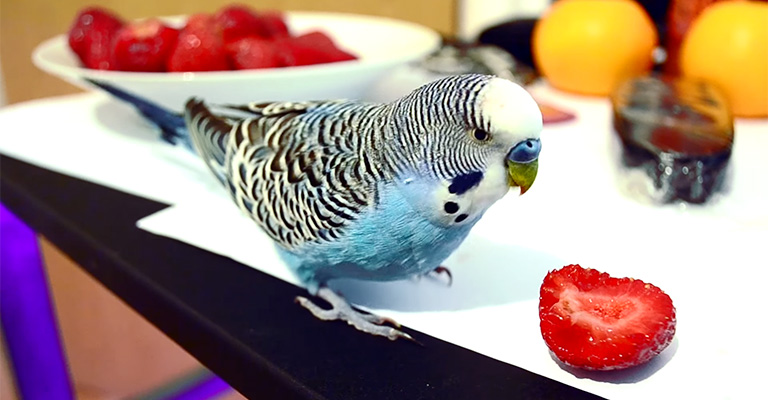The fascination with avian visitors in our gardens and backyards often leads us to explore the possibilities of offering them a varied and nutritious diet. Among the many questions that arise, one frequently asked is, “Can birds eat strawberries?”
These juicy, red fruits are not only a delight for humans but also hold potential benefits for our feathered friends.
In this exploration, we delve into the world of bird nutrition, uncovering the answer to this query.
We’ll explore the nutrients found in strawberries and the potential advantages they offer to birds.
From essential vitamins and antioxidants to hydration and energy, strawberries bring a wealth of nutrients that can enhance the health and vitality of our avian companions.
Understanding the compatibility of strawberries with bird diets sheds light on responsible bird-feeding practices and deepens our connection to the natural world.

Can Birds Eat Strawberries- Nutrients And Benefits?
Birds can indeed eat strawberries, and these juicy fruits offer several benefits for our feathered friends.
Here are some advantages of including strawberries in a bird’s diet:
Vitamin C
Strawberries are a fantastic source of vitamin C, which is an essential nutrient for birds. Vitamin C helps boost the immune system, fight infections, and prevent scurvy.
Vitamin C also helps the body absorb iron, which is important for blood health.
Antioxidants
Strawberries are rich in antioxidants, which are compounds that protect the cells from oxidative stress and damage. Antioxidants can help prevent chronic diseases, such as cancer, diabetes, and heart disease.
Antioxidants also help maintain the skin and feather health of birds.
Folate
Strawberries contain folate, which is a type of B vitamin that is involved in DNA synthesis and cell division.
Folate is especially important for pregnant and breeding birds, as it helps prevent birth defects and support the growth of the embryos.
Folate also helps prevent anemia, which is a condition where the blood lacks enough red blood cells.
Potassium
Strawberries provide potassium, which is a mineral that helps regulate the fluid balance and blood pressure in the body.
Potassium also helps maintain the nerve and muscle function of birds. Potassium can help prevent dehydration, which can be a problem for birds in hot weather or when they are stressed.
Fiber

Strawberries are a good source of fiber, which is a type of carbohydrate that helps the digestive system function properly.
Fiber can help prevent constipation, diarrhea, and dysbiosis, which are common digestive issues in birds. Fiber can also help lower the cholesterol and blood sugar levels in birds.
Hydration
Strawberries have a high water content, which makes them a great fruit to offer to birds for hydration.
Hydration is vital for birds, as it helps regulate their body temperature, metabolism, and organ function. Hydration also helps flush out toxins and waste from the body.
Carbohydrates
Strawberries contain natural sugars, which are a type of carbohydrate that provides energy for birds. Carbohydrates are the main source of fuel for the brain and muscles of birds.
Carbohydrates can also help improve the mood and behavior of birds, as they stimulate the production of serotonin, a neurotransmitter that regulates happiness and well-being.
Variety
Strawberries are a great fruit to offer to birds for variety. Variety is important for birds, as it helps prevent boredom and stress, which can lead to health and behavioral problems.
Variety also helps ensure that birds get all the nutrients they need from different sources.
Taste
Strawberries are delicious fruits that many birds enjoy eating. Taste is an important factor for birds, as it influences their appetite and food preferences.
Taste can also help bond with your bird, as you can share strawberries with them as a treat or reward.
Are There Any Drawbacks To Feeding Strawberries to Birds?

Feeding strawberries to birds can have some drawbacks and potential issues to consider.
Here are some drawbacks associated with offering strawberries to birds, along with brief descriptions for each:
Sugar
Strawberries contain natural sugars that may be too much for some birds’ systems to handle. Too much sugar can lead to health issues for these little birds, such as obesity, diabetes, and liver problems.
Therefore, moderation is key. You should only feed strawberries as an occasional treat, not as a staple food.
Allergies
Just like us, birds can have allergies, and strawberries may be one of their triggers. Some birds may be allergic to strawberries or other fruits and show symptoms such as sneezing, itching, swelling, or breathing difficulties.
If you notice any of these signs in your bird after feeding it strawberries, you should stop immediately and consult your veterinarian.
Pesticide Residue
Conventionally grown strawberries may contain pesticide residues that can be harmful to birds. Pesticides can cause various health problems for birds, such as neurological disorders, reproductive issues, and cancer.
To minimize this risk, opt for organic strawberries or thoroughly wash the fruit before offering it to your pet bird.
Overconsumption And Diet Balance
Like any other treat, strawberries should be fed in moderation to ensure that pet birds maintain a balanced diet. Feeding too many strawberries can cause nutritional imbalances and deficiencies in your bird’s diet, as well as digestive problems.
You should follow the recommendations of your veterinarian or avian nutritionist on how much and how often to feed strawberries to your bird.
Interesting Ways To Serve Strawberries to Birds
Serving strawberries to birds can be an enjoyable and creative way to enhance their feeding experience.
Here are some interesting ways to present strawberries to birds, along with descriptions for each:
Skewered Strawberry Kabobs
Thread fresh strawberry halves onto wooden skewers, creating colorful kabobs. Hang them from tree branches or feeder hooks for a visually appealing and easily accessible treat.
Strawberry Slices on a Tray
Offer sliced strawberries on a flat tray or shallow dish, providing birds with an easy-to-see and accessible dining platform. This allows multiple birds to enjoy the fruit simultaneously.
Hollowed Strawberry Feeder
Carefully hollow out a few strawberries, leaving a small well in each one. Fill the cavities with bird-friendly seeds, creating a combination treat that appeals to birds’ tastes and preferences.
Strawberry Smoothie
Blend strawberries with a bit of water to create a thick, pulpy mixture. Spread it onto tree bark, branches, or a hanging log to provide birds with a fun, interactive feeding experience.
Frozen Strawberry Ice Pops
Create ice pops by freezing strawberries in water or fruit juice. Birds can peck at the icy treat to obtain both hydration and nutrition, especially during hot weather.
Strawberry Vine Basket
Attach a small basket or mesh bag filled with strawberries to a hanging branch. Birds can perch and pluck their snacks directly from the basket, adding a touch of natural charm to your feeding area.
Strawberry Garland
String whole strawberries onto a length of twine or thread to make a decorative garland. Hang it across tree branches or outdoor structures, providing birds with a visually enticing and edible display.
Strawberry Bird Feeder Ornaments
Create bird feeder ornaments by filling strawberry halves with a mixture of birdseed and suet. Hang these fruity ornaments from trees or hooks to entice birds with a blend of flavors and textures.
Strawberry Flower Bed
Plant strawberry plants in your garden to attract birds. As the fruit ripens, birds will visit to pluck the strawberries directly from the plants, adding a touch of natural beauty to your landscape.
These creative ways to serve strawberries not only provide nourishment but also offer visual appeal and entertainment for both birds and birdwatchers.
Experimenting with different methods can make your backyard a welcoming oasis for feathered friends.
FAQ
Yes, many bird species can safely consume strawberries. They provide essential nutrients and hydration.
Strawberries offer vitamins, particularly vitamin C, antioxidants, and natural sugars that provide energy for birds.
Fresh, pesticide-free strawberries can be sliced or halved and presented on a tray or skewered on branches.
While nutritious, strawberries should be part of a varied diet. Birds benefit from a mix of fruits, seeds, and insects.
Potential drawbacks include mold growth, attracting unwanted pests, and the need for moderation due to the fruit’s sugar content.
Conclusion
The question of whether birds can eat strawberries is met with a resounding “yes.” These luscious fruits provide a wealth of nutrients and benefits for our feathered friends.
From vitamin C to antioxidants, hydration to quick energy, strawberries offer an array of advantages that can enhance the overall health and well-being of birds.
However, it is essential to exercise caution when offering strawberries to birds. Ensure the fruit is fresh, free from mold, and, most importantly, free from pesticide residues that could harm these delicate creatures.
Moderation is key, as strawberries should be part of a balanced diet that includes a variety of natural foods.
By incorporating strawberries responsibly into bird feeding practices, we not only support the health of our avian visitors but also foster a deeper appreciation for the intricacies of nature’s dietary web.